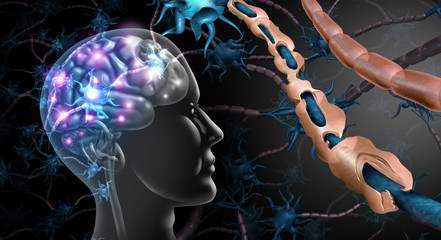
Stem Cell Transplants Show Promise in Delaying Disability
About 2.8 million people worldwide live with multiple sclerosis (MS) — a chronic neurological disease affecting the body’s central nervous system.
There are four types of MS, including secondary progressive MS. This is a later stage of MS where a person’s symptoms steadily worsen over time, potentially causing disability.
Past research finds about two-thirds of people with relapsing-remitting MS transition to secondary progressive MS during the course of the disease.
Treatment for secondary progressive MS focuses on symptom management and slowing disease progression through disease-modifying drugs. There is currently no cure for MS.
Now a team of researchers from the University of Genoa in Italy found hematopoietic stem cell transplants using a person’s healthy blood stem cells help delay disability longer in people with active secondary progressive MS than some MS medications.
The recent study appears in Neurology, the medical journal of the American Academy of Neurology.
Hematopoietic stem cell transplant (HSCT)
Hematopoietic stem cell transplantation (HSCT) is a treatment using healthy blood or bone marrow stem cells. The healthy stem cells either come from the person (autologous) or another person (allogeneic).
Stem cells are special cells in the body capable of turning into different types of cells. The body can use them to repair areas with lost cells. For this reason, doctors and scientists are looking at using stem cells as a treatment option for diseases.
HSCT is currently used to treat male germ cell tumors, also known as testicular tumors. Researchers have also studied HSCT in treating other cancers, including metastatic breast cancer.
In addition, HSCT is a treatment option for certain blood-related diseases, including lymphoma, leukemiae, and sickle cell disease.
Previous studies have also looked at the use of HSCT for treating MS.
HSCT and secondary progressive MS
Why is a treatment like HSCT important for people with secondary progressive MS?
Medical News Today spoke with Prof. Matilde Inglese, professor of neurology at the University of Genoa, IRCCS Ospedale Policlinico San Martino in Genoa, Italy, and lead author of this study.
“Unfortunately, most of the available disease-modifying treatments are efficacious in relapsing-remitting MS but not in secondary progressive MS characterized by less inflammatory activity and more severe neurodegeneration,” Pro. Inglese explained. “(HSCT) can help by ceasing inflammation and delaying the accrual of clinical disability.”
For this study, Prof. Inglese and her team examined the data of 79 people with active secondary progressive MS who received autologous hematopoietic stem cell transplants (AHSCT). They compared that data to information from almost 2,000 people with active secondary progressive MS treated with MS drugs.
Each participant’s disability level was measured using the Expanded Disability Status Scale. Scores range from no symptoms (zero) up to death due to MS (10). Researchers assessed participants’ scores at various stages over 10 years.
HSCT treatment vs. MS medications
At the beginning of the study, participants had a median score of 6.5 — defined as needing to constantly use a cane or brace on both sides of the body to walk 20 meters without resting — for both groups.
After 10 years of treatment, scientists found people who received stem cell transplants decreased their score by an average of 0.01 points per year, showing a decrease in disability. Conversely, the score for people who took MS medications increased by 0.16 points each year, showing an increase in disability.
“There is scientific evidence that the transplantation of autologous hematopoietic stem cell transplantation after intense immune suppression can induce a resetting of the autoreactive blood white cells (lymphocytes) responsible for the disease pathogenesis, which are replaced by new and self-tolerant white cells.”
– Prof. Inglese
MS clinical trials underway
Looking ahead, Prof. Inglese said her team has just started a multicenter randomized controlled clinical trial in Italy. Their goal is to investigate the efficacy of autologous transplantation of hematopoietic stem cells against the best available high-efficacy treatment in patients with very active relapsing-remitting MS.
“Similar clinical trials are ongoing in the UK, Norway, and the USA,” she added. “The latter includes not only patients with relapsing-remitting MS but also patients with active secondary-progressive MS.”
MNT also spoke about this study with Dr. Barbara Giesser, a neurologist and MS specialist at Pacific Neuroscience Institute at Providence Saint John’s Health Center in Santa Monica, CA.
Dr. Giesser stated this study reports similar findings to other studies of AHSTC in patients with progressive MS, where patients with “active,” i.e. inflammatory disease, tend to have better responses to this therapy than patients without activity.
“In general, AHSCT has been reported to produce better results in younger patients who have evidence of inflammation, i.e. RR or ‘active’ progressive disease,” she explained.
“While it is notable that the disability scores of the stem cell transplant patients were basically stable at 10 years, the average increase in disability scores of the other group of 0.16 points, while statistically significant, would not be clinically significant,” Dr. Giesser added.
She also mentioned having new treatment options for secondary progressive MS is important as “our current disease-modifying therapies are less effective for progressive disease, particularly non-active progressive disease.”
------------------------------------------------------------------------------------------------
Pedagogy Education offers online continuing education courses in a variety of ways to meet your education goals and budget!
Courses may be purchased individually, or in packages (a bundle of courses, offered at a 10% discount). To view our entire catalog of education, click here. We offer a huge selection of infusion, vascular access, and state-specific IV "certification" courses!
We have annual memberships available to individuals or facilities who want to offer their staff access to a library of education for an entire year. Click here to view our Infusion and Vascular Access CE Membership. Facilities can visit our Annual Memberships to learn more about our nurse and nurse aide custom membership options and to view pricing!
Ready to purchase a course, package, or membership? Start here by creating your account! Want to receive our emails with notifications of new course releases and coupon codes good for discounts on courses? Sign up for our emails here. We would LOVE to have you join us on our social media pages, follow us on Facebook, Twitter, LinkedIn, Instagram, and Pinterest. Watch out for exclusive promo codes!
For organizations that would like to purchase education for their entire staff, email sales@pedagogyeducation.com and let us know the course(s) of interest and how many staff members you need to provide education for, and we will be happy to send you a price quote.

